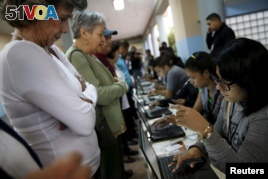07 December, 2015
The socialist government in Venezuela has lost control of the legislature after national elections, say officials.
Officials say the opposition won 99 of the 167 seats in the National Assembly. By comparison, the Socialist party that led the country for 16 years won 46 seats. Not all votes have been counted.
The votes reject the socialist economic policy of former president Hugo Chavez, who died in 2013, experts say. Chavez' successor, President Nicolas Maduro, continued those policies.

People register to cast their vote at a polling station during a legislative election, in Caracas December 6, 2015. (REUTERS/Carlos Garcia Rawlins)
In a televised speech after the election, Maduro admitted to "adverse results."
Venezuela has the world's largest oil reserves. But the price of oil has dropped sharply. Now, the country has very high inflation. Many products are no longer sold. And people must wait in long lines to buy food.
Opposition leaders had for many years accused Chavez and Maduro of suppressing political debate and jailing competing politicians and activists.
Last week, police arrested three people accused of killing opposition candidate Luis Diaz in the central state of Guarico.
Diaz was shot in late November at a political gathering he was attending with Lilian Tintori, the wife of jailed opposition leader Leopoldo Lopez. Government officials deny responsibility for the killing.
I'm Mario Ritter.
VOANews.com reported this story. Christopher Jones-Cruise adapted it for Learning English. Kathleen Struck was the editor.
We want to hear from you. Write to us in the Comments section or on 51VOA.COM.
________________________________________________________________
Words in This Story
socialist – adj. describing a society in which major industries are owned and controlled by the government rather than by individual people and companies
successor – n. a person who has a job, position or title after someone else; someone who succeeds another person
adverse – adj. bad or unfavorable; not good
reserves – n. a supply of something that is stored so that it can be used at a later time